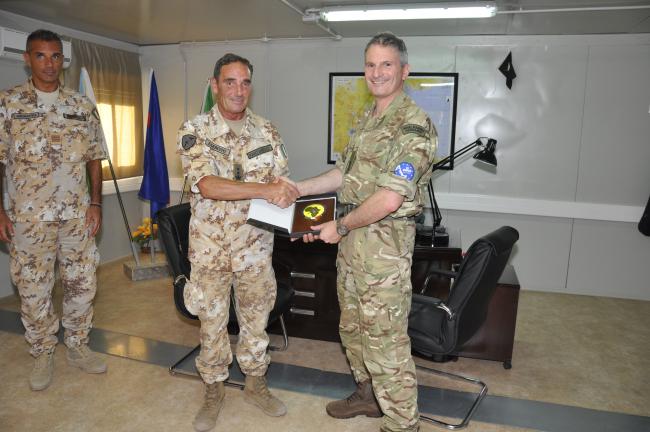Having taken Operation Command of the EU Naval Force at the end of August, a priority for Major General Martin Smith MBE was to visit the Horn of Africa and the east African region to strengthen ties with the EU’s partners and highlight EU Naval Force’s commitment in the fight against Somali piracy.
On Monday 22 September, the Operation Commander’s first port of call was to the key logistical hub of Djibouti, where he was met by the EU Ambassador to Djibouti, Joseph Silva.
Major General Smith’s first visit was to the Italian Military Support Base in Djibouti. After a short introduction on the Base’s role and activities, Major General Smith was given a briefing about the Italian Air Force’s remote controlled aircraft, known as Predator and how it is being integrated into the European Union’s counter-piracy mission, Operation Atalanta.
Predator has been based in Djibouti since 6th August 2014. In the coming months it will be used to monitor the seas off the coast of Somalia where pirates have been known to operate and it has the capability, when airborne, to give an early warning of a possible attack against merchant shipping.
As is the case with EU Naval Force warships and Maritime Patrol and Reconnaissance Aircraft, the remote controlled aircraft can also be used to monitor the safety of World Food Programme vessels as they transit along the Somali coast.
During his visit, Major General Smith expressed his thanks to the Italian forces for their outstanding support to Operation Atalanta and the excellent air reconnaissance results achieved so far by Predator.
During his visit to Djibouti, the Operation Commander also visited MV Douro, a vessel recently charted by the World Food Programme to carry humanitarian aid to the Somali people.
As MV Douro sails along the Somali coast, it will be protected from pirate attack by a Serbian Autonomous Vessel Protection Detachment, or AVPD, operating under the Operation Atalanta flag.
Before Major General Smith departed MV Douro, he spoke directly to the Serbian Forces on board.
“The work of the Serbian team is crucial in ensuring the food aid reaches the people of Somalia. I am proud of the task this detachment will perform - it is a way in which we can help the WFP make a real difference to the lives of people in desperate need. I’m also delighted to see Serbia, although not part of the EU, operating within Operation Atalanta; a unique cooperation.”
During his visit to the Horn of Africa, Major General Smith also took the opportunity to embark in the EU Naval Force flagship, Italian Navy destroyer, ITS Andrea Doria, at sea off the coast of Djibouti. After being welcomed on board by the EU Force Commander, Rear Admiral Guido Rando, Major General Smith was given a tour of ITS Andrea Doria and briefed on her capabilities.
A briefing in the Operations Room highlighted the warship’s state of art command and control and radar systems that are able to detect, amongst other things, small vessels at sea, such as those commonly used by Somali pirates to attack merchant ships.
Major General Smith then flew on to Mogadishu, where he met the Somali Prime Minister, Abdiweli Sheikh Ahmed and Minister of Defence, Mohamed Shiekh Hassan and others. The meeting was an opportunity to discuss face-to-face the on-going threat and importance of regional cooperation to help secure a lasting solution to piracy.
Major General Smith was accompanied during his visit to Mogadishu by the head of the EU Delegation to Somalia, Mr Michele Cervone, the Head of the EU Training Mission in Somalia, Brigadier General Massimo Mingiardi, and the head of EUCAP Nestor, Mr Etienne de Poncins.
Before he departed Mogadishu to return to the UK, Major General Smith commented “I have welcomed the opportunity to visit the EU’s regional partners. I am in no doubt that piracy continues to pose a threat to ships passing through the Gulf of Aden and the Somali basin. The criminal structures, the intent and capability are still in place and the International Community needs to remain vigilant.”
